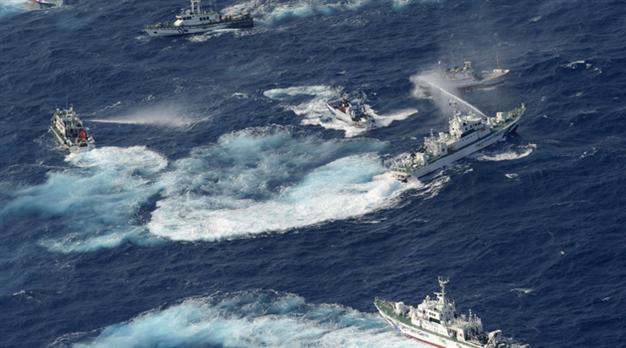Japan, Taiwan fire water cannon near disputed islands
TOKYO - Agence France-Presse

AFP photo
Coastguard vessels from Japan and Taiwan dueled with water cannon today after dozens of Taiwanese boats escorted by patrol ships sailed into waters around Tokyo-controlled islands.
Japanese coastguard ships sprayed water at the fishing vessels, footage on national broadcaster NHK showed, with the Taiwanese patrol boats retaliating by directing their own high-pressure hoses at the Japanese ships.
The large-scale breach of what Japan considers sovereign territory -- one of the biggest since WWII -- is the latest escalation in a row over ownership of the islands that pits Tokyo against Beijing and Taipei.
The intrusion complicates the already volatile territorial dispute with China. Taiwan has said that officers aboard some of the patrol ships sent to the area are fully-armed elite coastguard personnel.
Japan's Chief Cabinet Secretary Osamu Fujimura told a press conference that by 9:00 am (0000 GMT) eight Taiwanese coastguard and 40 fishing boats were in Japanese waters.
"We have made contact with the Taiwan authorities, and told them that they cannot enter our territorial waters," he said. A spokesman for Taiwan's coastguard confirmed that nearly 60 boats got close to the islands, some coming within three nautical miles -- well inside the 12-nautical-mile territorial exclusion zone.
Japan's coastguard said all vessels left territorial waters a few hours later.
The boats are part of a fleet that left Taiwan on Monday, vowing to stake their claim to islands where they say they have ancestral fishing rights.
More than 60 fishing boats flying Taiwan flags left Suao, a port in northeast Taiwan, at 0700 GMT Monday, with 300 fishermen and 60 reporters on board.
Taiwan's coastguard sent at least 10 patrol boats alongside the vessels.
"We'll do everything to protect our fishermen. We do not rule out using force to fight back if Japan were to do so," Wang Chin-wang, head of the Coast Guard Administration, said in parliament.
Japan administers the uninhabited, but strategically well-positioned archipelago under the name Senkaku. Beijing says it has owned the islands for centuries and calls them Diaoyu.
Taiwan also claims the islands, which lie around 200 kilometers from its coast.
Ownership of the islands has become an important tenet of identity for all three claimants; the possible presence of energy reserves in the nearby seabed adds to the mix.
The last large intrusion into Japanese waters was in 1996, according to a spokesman at the Tokyo headquarters of the Japan Coast Guard.
He said at that time 41 ships carrying activists from Hong Kong and Taiwan entered waters around the islands with the intention of asserting sovereignty.
Chen Chun-sheng, the head of the Suao Fishermen Association, said at the weekend: "Diaoyutai has been our traditional fishing ground for centuries. We pledge to use our lives to protect it or we'd disgrace our ancestors." Fujimura said Japan was handling Tuesday's situation as delicately as it could.
"All in all, we must continue to take utmost caution for policing of the areas surrounding the Senkaku islands. Agencies concerned must continue to closely coordinate their actions," he said. "Japan's position is that, in light of good Japan-Taiwan relations, we must solve the issue peacefully. We wish to respond calmly." Relations between Japan and China, meanwhile, have scraped long-unseen lows in recent weeks following Tokyo's nationalization of three of the islands, which it bought from a private Japanese landowner.
Several days of sometimes violent protests erupted in cities across China, where Japanese businesses were targeted by rioters.
Japan's coastguard said yesterday that of two of China's maritime surveillance ships had spent seven hours in territorial waters around Uotsurijima, the largest island in the chain.
Two fisheries patrol boats briefly also entered the 12-nautical-mile zone around the chain, the coastguard said.
Four marine surveillance ships and two fisheries patrol boats were in contiguous waters as of 9:00 am Tuesday (0000 GMT), according to the coastguard.
None of the Chinese ships sent to the area belongs to the military. Both types of vessel are government-owned and used to enforce Chinese law in domestic waters.
